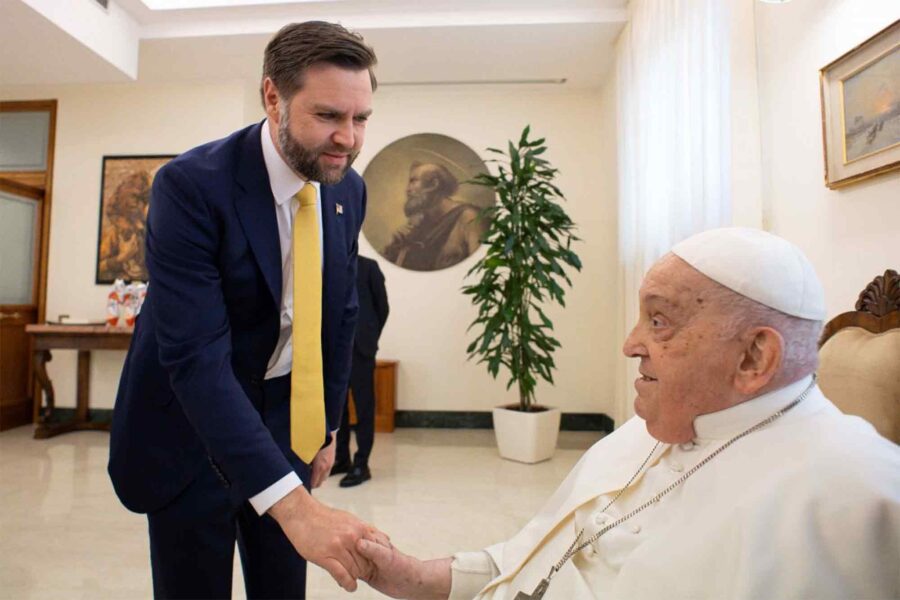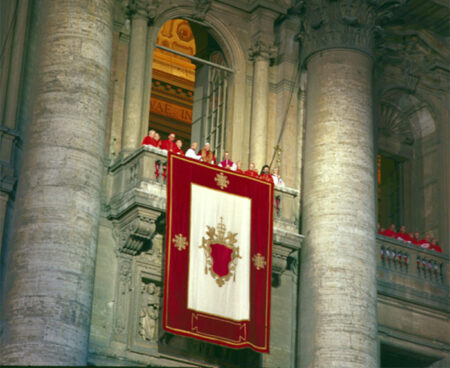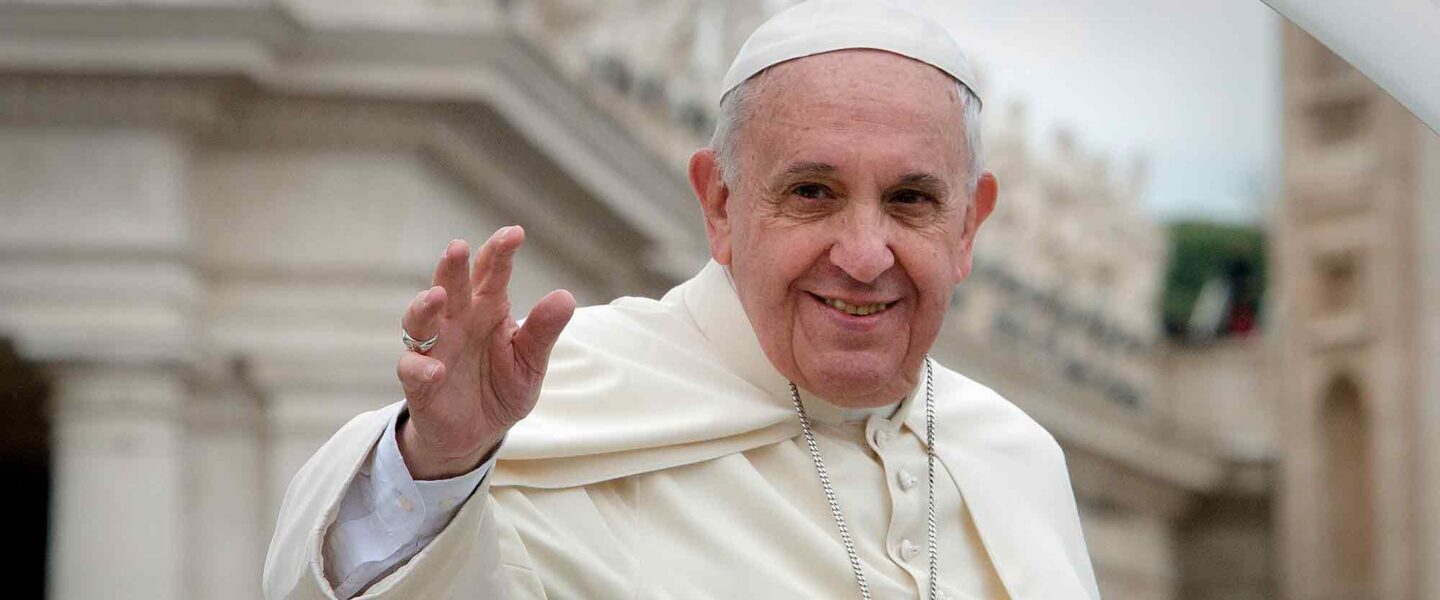The Passing of a Genuinely Christian Pope
Pope Francis tried to return us to the basic values that Christ preached.
|
Listen To This Story
|
Pope Francis, who died the day after Easter Sunday, arguably had more in common with the plain style of Jesus than did many of his predecessors. Born Jorge Mario Bergoglio in the Flores neighborhood of Buenos Aires, Argentina, Francis was also the first pope since the eighth century who was not a native European.
He had that in common with Jesus, who began his career as a poor Jewish carpenter from Nazareth in what is now northern Israel, and could himself hardly be classified as a European. The only other candidate to succeed in becoming pope who was not European was Gregory III, who came from what is now Syria and became pope in 731.
In the spirit of Jesus, Francis emphasized personal humility, rejecting the pomp and circumstance that one usually associates with political power. Unlike some of his more extravagant predecessors, and a few contemporary politicians and business titans such as Elon Musk and Jeff Bezos, he adhered to the Biblical admonition that it is easier for a camel to pass through the eye of a needle than it is for a rich man to enter the kingdom of God.
Francis often surprised his personal aides in the Vatican by preferring to handle menial chores himself rather than assign them to someone else. Given the choice, he would rather drive an inexpensive old car than be seen in an ostentatious limousine. When not carrying out his official functions, he preferred to dress plainly.
More importantly, just as Jesus had defended the poor and vulnerable members of society, Francis, the first pope to be born in the Americas, felt an affinity for the waves of immigrants forced to leave their homes because of crushing poverty and political repression.
It was a very different view from that of President Donald Trump and his attack dog, Vice President JD Vance, who callously dismiss many foreigners either as insane or as dangerous thieves, rapists, and hardened criminals. Pope Francis initially demurred at receiving Vance, a late convert to Catholicism, as an official Easter Sunday visitor, but then generously agreed to give him a brief audience, despite the fact that Vance’s record opposes nearly everything that Francis stood for. Whether Francis had any impact on Vance’s thinking, only Vance knows.

While Francis achieved a reputation for humility, that humility did not indicate an absence of power or decisiveness. As pope, he was the leader of the faith to the world’s 1.4 billion Catholics. At least in terms of numbers, that positioned him to have enormous spiritual influence over more than a sixth of the world’s population. Although he held some conservative views, Francis nevertheless remained popular with younger generations, perhaps because, unlike many who proclaim themselves Christians, he actually believed in and followed the teachings of Christ.
A Moving Tribute to a Papal Predecessor
I am not a Catholic, but I found myself drawn into covering Vatican affairs during the summer of 1978 as a radio correspondent for ABC News. The occasion was the death of Pope Paul VI. After his death, the pope’s body was put on display at a succession of palaces around Rome. The summer heat was terrible, and fans were placed around the coffin to blow away any unfortunate odors. A somewhat cynical band of journalists began making jokes about how long these ceremonies would take before the situation became unbearable.
Finally, the day of the funeral arrived, and I was positioned atop the colonnades surrounding St. Peter’s Square. The square was filled with some 300,000 people, including most heads of state and a number of celebrities, including Jacqueline Kennedy. With the casket exposed in the center of the square, Pope Paul’s final will was read aloud to the audience. It began, “Hear these words of a dying pope. To Rome I leave my heart…”
For some reason, despite the cynicism of the preceding weeks, I suddenly felt moved. Here was a man who had presided over the Second Vatican Council, during which the decision had been made to allow the Catholic Mass, which had previously been spoken in Latin, to be delivered in local languages so that, for the first time, Catholic congregations could actually understand what was being said. Instead of the secrets of the church being reserved for a small, educated elite, the church was beginning to make itself understandable to everyone.
Resistance to these changes had been harsh, and yet Paul VI had done his best to steer the Catholic faith through the shoals of disharmony and to hold it all together. He had been the first pope to travel outside Italy since 1809, and he had expanded the church’s vision as much as he could without having it fly to pieces.
When the will had been read and the pallbearers lifted the casket, a general awareness swept through the silent crowd — this is what this man had achieved, and we would never see him again. A sudden, spontaneous applause erupted in unison from the hundreds of thousands of people in the square below me. It was genuine, and it was something that I will never forget.
I stayed in Rome for the election of Pope John Paul I. It seemed to me at the time that American Catholics cared much more about the pope than did the Italians, who seemed a bit jaded by Vatican politics. In any case, Paul VI’s time in office had been so turbulent that the cardinals decided to choose an older Pope whose reign would be limited by age if nothing else.
They got their wish. John Paul I lasted exactly 33 days in office and then died. I was back in Rome for the election of John Paul II. As the movie The Conclave shows, the cardinals meet and cast ballots that are then burned in a small stove. If the smoke is white, a new pope has been elected. If the smoke is black, the vote is inconclusive, and a new vote is called for.
ABC had positioned me on the roof of the Vatican opposite the smokestack leading to the stove of the cardinals. The Vatican radio reporter was in an enclosed booth right next to me. We both anxiously watched the smokestack for hours. In the end, it turned out that the Vatican radio booth had smoked glass windows. When the white smoke appeared announcing John Paul II’s election, the Vatican radio reporter couldn’t see that the smoke was white, but I could. I had a minor scoop for a few minutes before the Vatican reporter found out what had happened.
The ritual and pageantry are impressive, but of course they tell us little about the substance and impact of a new pope’s tenure. John Paul II ultimately played a critical role in helping his home country, Poland, cast off the shackles of Soviet neocolonialism. His importance may have been more political than spiritual.

A Spiritual Leader in Troubled Times
In Pope Francis’s case, it is the spiritual that counts, especially his emphasis on basic Christian values that are increasingly under attack by the hard Right in both Europe and the United States.
The 20th century American scholar, Joseph Campbell, who spent a lifetime studying mythology, noted that, in the early stages of human development, religion and myths were critical to maintaining social order and to organizing the basic structure of societies. As mankind learned more and began to think more critically, the internal contradictions in the myths became more apparent. We know now that there is no chariot carrying the sun across the sky, and we know that the wind and the sea are not controlled by Neptune or any other gods.
The problem, Campbell pointed out, is that as we let go of the mythology, the philosophical glue that holds society together begins to slip away as well. The result of changes in what is morally acceptable is likely to be jarring, and there is bound to be social resistance.
The hard-right movements in both Europe and the United States described themselves as conservative in the beginning but then quickly evolved into full-fledged reactionary forces. In their later stages, they have become a reaction against science, multiculturalism, and basic human rights. And finally, they have turned into an argument for authoritarian control over the public.
The claim is that all this is done to maintain traditional, Christian values. The problem is that those reactionary values have nothing to do with, and in fact tend to be antithetical to, the values that Jesus preached.
There is nothing particularly new in any of this: The Bible, in fact, predicts that the End of Time will see the appearance of an Antichrist who will try to seize power. The Antichrist, accompanied by false prophets, will pretend to be Christ, but will try to trick us into accepting all the things that Christ preached against.
That sounds pretty much like the situation we find ourselves in now.
Pope Francis tried to return us to the basic values that Christ preached. Are we our brother’s keeper? Are we responsible for what happens to our fellow man? Are we responsible for taking care of the poor and infirm? Jesus certainly preached that we are. It was the essence of his message. Should we seek vengeance against those who have done us wrong? Jesus preached that vengeance is best left to God; that if someone does something wrong, we should try to understand and seek a human solution, not engage in evil to fight evil. Jesus taught us that it is better to love than to hate.
The anti-Christians preach that hate is natural and that we should act on it. In the confusion that results from these tangled messages, Francis tried simply to remind us of basic truths. He disagreed with JD Vance on the treatment of asylum seekers who have come to the US because they risked torture and death at home, and yet he did not refuse to see Vance — even though he was near death.
That openness will stand eternally to Francis’s credit as pope. We can only hope that whoever replaces him will be cut from the same cloth.

